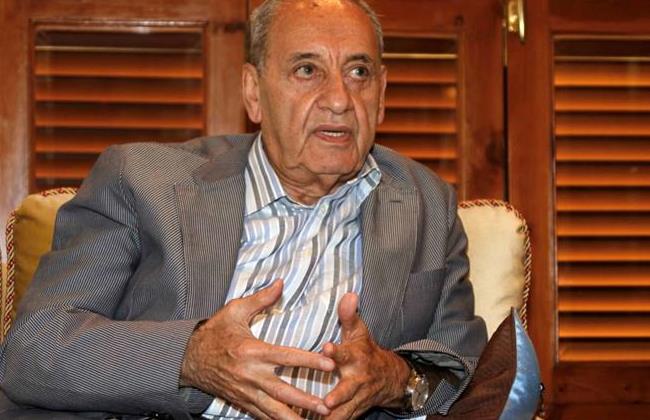Berri: U.S, Saudi Arabia back Future, Hezbollah talks
Hussein Dakroub/The Daily Star/Nov. 26, 2014
BEIRUT: The United States and Saudi Arabia have voiced support for the planned dialogue between the Future Movement and Hezbollah, Speaker Nabih Berri said Tuesday.
Berri, according to visitors, said he had won support for the long-awaited talks between the Future Movement and Hezbollah from U.S. Ambassador David Hale and Saudi Ambassador Ali Awad Asiri during separate meetings with them at his Ain al-Tineh residence Tuesday.
Asked about his attempts to promote a dialogue between Hezbollah and the Future Movement, Berri was quoted by visitors as saying: “I am waiting for the Future Movement to send its agenda proposal, while I continue to prepare a proposal for this agenda.”
The Future parliamentary bloc called Tuesday for an initiative by rival factions to reach a national compromise over the election of a new president, warning that the continued vacuum in the top Christian post entailed dire consequences for the country’s volatile security and struggling economy.
Saudi Arabia, meanwhile, appealed to the feuding Lebanese parties to close ranks and quickly elect a president without waiting for the outcome of regional developments.The Future and Saudi calls came as efforts have been intensified to launch a dialogue between the Future Movement and Hezbollah aimed primarily at defusing sectarian tensions and facilitating the election of a successor to former President Michel Sleiman, whose six-year tenure ended on May 25.
The Future bloc lamented that the 71st anniversary of Lebanon’s independence last week came amid “the continued presidential vacancy that carries with it the aggravation of various risks to which Lebanon is exposed at the national, security, political and economic levels.”
It said the repercussions and reverberations of the 6-month-old presidential deadlock harmed the state’s role, credibility and reputation and reflected negatively on the Lebanese people’s interests, security, civil peace and living standard.
“The vacancy in the presidency and the continued boycott by Hezbollah and [MP Michel Aoun’s] Change and Reform bloc and their obstruction of [Parliament] sessions to elect a president have aggravated this abnormal dangerous situation in the country,” the bloc said in a statement after its weekly meeting chaired by former Prime Minister Fouad Siniora.
“Therefore, salvation in this case requires an initiative for a national action with the participation of all the parties to reach a national compromise under which a consensus over the next president could be achieved,” the statement added.
Parliament failed this month for the 15th time since April to elect a president over a lack of quorum, as the rival March 8 and March 14 parties remain split over a consensus candidate for the presidency.
In the absence of an internal accord to elect a president, senior government officials have said that a regional consensus, mainly between Saudi Arabia and Iran, was essential to break the presidential stalemate.
“We might be able within months to reach a sort of regional agreement that could allow the election of a president, especially since the election of a president in Lebanon is not a Lebanese decision,” Interior Minister Nouhad Machnouk said in a TV interview Tuesday.
He also said that dialogue between the Future Movement and Hezbollah should help protect Lebanon from the consequences of the fast-moving developments in the region.
“We are undoubtedly going through a transitional phase in Lebanon that is part of a transitional phase that the whole region is going through,” Machnouk said during a ceremony commemorating the United Arab Emirates 43rd anniversary in Abu Dhabi.
The Saudi envoy, Asiri, called for Lebanese unity and the swift election of a president, saying his country supported an inter-Lebanese dialogue.
“Saudi Arabia sees that the top priority that Lebanon needs now is boosting its unity and a consensus among all the political parties to hold a serious dialogue and speed up the election of a new president in isolation of the ongoing events in the region and their repercussions,” Asiri told reporters after meeting Berri in Ain al-Tineh.
In a TV interview, Asiri said his country encouraged a dialogue between the Future Movement and Hezbollah if it served Lebanon’s interest.
“Saudi Arabia hopes that all the parties will engage in dialogue to find a solution to the crisis facing Lebanon, particularly the presidential crisis,” the Saudi envoy said.
For his part, Maronite Patriarch Beshara Rai said he welcomed the planned dialogue between the Future Movement and Hezbollah.
“Should a dialogue begin now between Hezbollah and the Future Movement, this means we have begun emerging from the black tunnel in Lebanon,” Rai told reporters at Beirut’s airport upon his return from Rome. He said the suspension of dialogue between the March 8 and March 14 parties has brought the country to where it is now.
Meanwhile, the Constitutional Council met Tuesday to discuss the challenge presented by the FPM against the extension of Parliament’s mandate for two years and seven months. The 10-member council will meet again Wednesday to continue its discussion into the FPM’s appeal filed against the extension. Aoun’s bloc Monday urged the council to take “a historic stand” by annulling the extension.




















